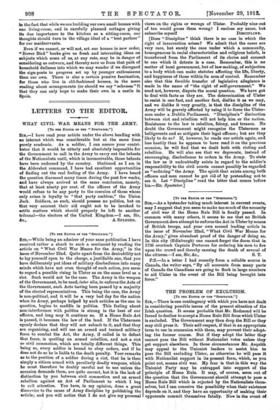[To THE EDITOR OF THE "SPECTATOR."]
Sin,—While being an admirer of your sane publication I have received rather a shock to such a sentiment by reading the article on "What Civil War Means for the Army," in the issue of November 22nd. Quite apart from the desirability not to lay yourself open to the charge, a justifiable one, that you have deliberately put ideas of military disobedience into many minds which have not even thought of such action, you seem to regard a possible rising in Ulster as on the same level as a riot. Such would not be the case. The Army is the weapon of the Government, to be used, inter aria, to enforce the Acts of the Government, such Acts having been passed by a majority of the elected representatives. This being the case, the Army is non-political, and it will be a very bad day for the nation when its Army, perhaps helped by such articles as the one in question, begins to meddle in politics. This feeling about non-interference with politics is strong in the best of our officers, and long may it continue so. If a Home Rule Act is passed, it becomes the law of the land. If the Ulstermen openly declare that they will not submit to it, and that they are organizing, and will use an armed and trained military force to combat the Act, the Army, if called in to defeat that force, is quelling an armed rebellion, and not a riot or civil commotion, which are totally different things. This being so, every soldier is bound to obey orders, and if he does not do so he is liable to the death penalty. Your remarks as to the position of a soldier during a riot, that he is then simply a citizen armed with peculiarly deadly weapons, which he must therefore be doubly careful not to use unless the occasion demands them, are quite correct, but it is the lack of distinction by you between civil commotion and an armed rebellion against an Act of Parliament to which I beg to call attention. You have, in my opinion, done a great disservice to the cause of Army discipline by publishing the article; and you will notice that I do not give my personal
views on the rights or wrongs of Ulster. Probably nine out of ten would guess them wrong! I enclose my name, but
[Does " Discipline " think there is no case in which the right of insurrection arises P We admit that the cases are very rare, but surely the case under which a community, homogeneous in racial characteristics and religious beliefs, is transferred from the Parliament of its choice and consent to one which it detests is a case. Remember, this is no matter of local government, but of law-making, of subjection to a body which can make statutes affecting the life, liberty, and happiness of those within its area of control. Remember also that this forcible transfer of legislative allegiance is made in the name of "the right of self-government." We need not, however, dispute the moral question. We have got to deal with facts as they are. The determination of Ulster to resist is one fact, and another fact, dislike it as we may, and we dislike it very greatly, is that the discipline of the Army will be gravely affected by using it to force the Ulster- men under a Dublin Parliament. "Discipline's" distinction between riot and rebellion will not help him or the nation. Resistance to the law is rebellion, felony, and treason. No doubt the Government might recognize the Ulstermen as belligerents and so mitigate their legal offence; but are they likely to do so P If, however, he reads our article again, and less hastily than he appears to have read it on the previous occasion, he will find that we dealt both with rioting and rebellion. He will also see that we deprecate, instead of encouraging, disobedience to orders in the Army. To state the law as it undoubtedly exists in regard to the soldier's responsibility to the civil courts cannot possibly be regarded as " seducing " the Army. The spirit that exists among both officers and men cannot be got rid of by pretending not to see it. Let " Discipline " read the letter that comes before his.—En. Spectator.]


















































 Previous page
Previous page